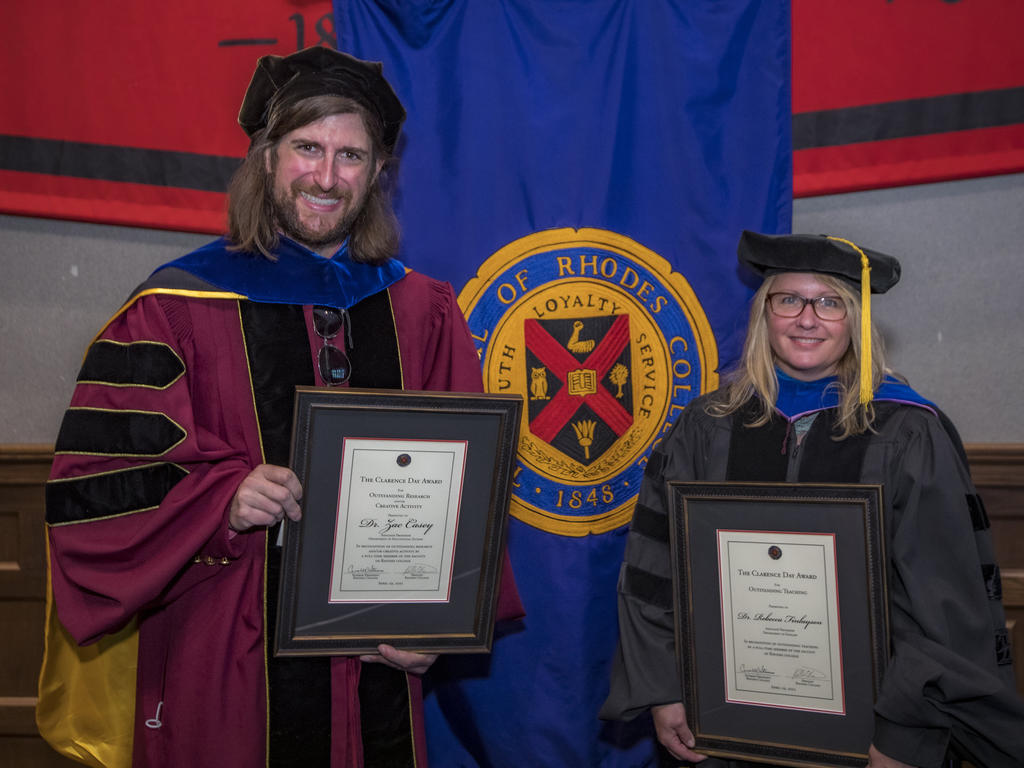Dr. Rebecca Finlayson and Dr. Zachary Casey were presented Rhodes College’s highest faculty honors for teaching and research at the college’s annual Awards Convocation, held on campus April 29.
Finlayson, associate professor of English, received the Clarence Day Award for Outstanding Teaching. Casey, associate professor and chair of educational studies, received the Clarence Day Award for Outstanding Research and/or Creative Activity. The awards, first given in 1981, were established by businessman and Rhodes alumnus Clarence Day and are provided by the Day Foundation.
***
The Clarence Day Award for Outstanding Teaching is given to a member of the faculty who has demonstrated excellence in teaching over the previous three years as determined by the assessments of students and colleagues, the effective use of imaginative and creative pedagogy, and a strong record of motivating students to embrace a life of continuing study.
Finlayson joined the Rhodes faculty in 1998 after completing a Ph.D. at Emory University. She teaches the First-Year Writing Seminar using The New Yorker as her text and courses on Shakespeare and general literature.
“As director of the Rhodes College Writing Program since 2001, Prof. Finlayson has fostered excellence in writing – and the teaching of writing – across our campus,” said Dr. Katherine Bassard, provost and vice president for academic affairs, who made the presentation.
Finlayson describes her own pedagogy as ‘organic,’ because of how it has evolved over the years in response to students’ needs. “Although I have taught the First Year Writing Seminar every semester,” she writes, “I have never taught the same course twice. For nearly every class session for the last 20 years, I have quite literally confronted a new topic, a new prep, a new discussion, all chosen by the students.”
One nominator wrote, “Rebecca’s teaching is distinguished by a sense of adventure. In practice, she relinquishes ownership of the classroom and meets her students on equal terms, taking risks just as they must.”
“She’s established a class where students can experiment with their writing, go out on literary limbs, learn from her thorough feedback, and grow as authors like we never could in a regular class,” wrote one student.
Others attest to how her courses have equipped and inspired them to teach writing to others. Finlayson’s English 290 – Academic Writing course, does just that. The course serves as a training ground for Writing Fellows, as well as the tutors who staff the Writing Center. In the past several years, Finlayson and her Writing Fellows have even taken what they have learned in the course into local high schools, forming partnerships to improve the teaching of writing in our community.
Finally, in her role as director of the Rhodes Writing Program, Finlayson has not only excelled in teaching writing, but also in developing and promoting a robust Writing Program by administering the Writing Center, creating the Writing Fellows program, and, for more than two decades, leading the immensely successful Summer Writing Institute, which attracts high school students from across the country.
***
The Clarence Day Award for Outstanding Research and/or Creative Activity is presented to a member of the faculty who has accomplished unusually significant professional work in the past three years and who has demonstrated that research and/or creative activity is an integral part of their discipline. This work must be demonstrated to have had an important effect on the award recipient’s teaching, directly benefiting Rhodes students by its influence on course content or pedagogy.
After completing his Ph.D. at the University of Minnesota, Casey joined the Rhodes faculty in 2014 and has helped to build the Educational Studies Program. He is an expert in teacher education, antiracist pedagogies, and critical whiteness studies and regularly is invited to speak at national and international conferences.
His first book, A Pedagogy of Anticapitalist Antiracism: Whiteness, Neoliberalism and Resistance in Education, was awarded the Outstanding Book Award by the Society of Professors of Education. One reviewer declared it groundbreaking. Casey’s recent book, Building Pedagogues: White Practicing Teachers And The Struggle For Antiracist Work In Schools, which he co-authored with Shanon McManimon, has been described by one reviewer as a “brilliantly written book that is deeply theorized, richly detailed, conversational, and engaging, with a self-critical honesty that cannot help but to draw the reader in. This book will change our profession and cannot come at a more demanding time.”
His other two books are Encyclopedia of Critical Whiteness Studies in Education and a co-edited volume, Whiteness At The Table: Antiracism, Racism, And Identity In Education. Casey serves as the executive editor for the Journal of Pedagogy and on the editorial board for the Journal of Curriculum and Pedagogy. He has authored dozens of journal articles, book chapters, reviews, and encyclopedia entries, several of which have been co-authored with his students.
One nominator wrote, “Dr. Casey brings this same level of academic rigor and commitment to building more equitable communities directly into his work with students, both in terms of his classroom approach and his continued commitment to publishing with Rhodes students.”
In addition, he is the principal investigator of a project to support undergraduates interested in becoming K-12 mathematics and science teachers in high-needs school districts and to participate in research opportunities throughout their degree program to expand their skill set as educators.
Casey also serves as the inaugural faculty mentor for Rhodes’ Posse Scholars, who are being equipped to thrive in the classroom and lead on campus, and he serves as the faculty adviser to the Kappa Delta Pi Educational Studies Honors Society, to name just a few of his many other roles on campus.
